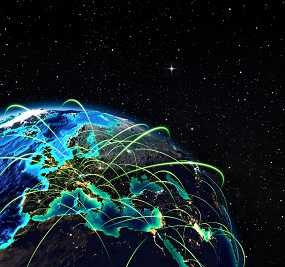A blueprint for an EU approach to a changing world order

Related topics
Society Social Science & Humanities Societal Challenges Europe in a changing world - Inclusive, innovative and reflective societies Belgium Denmark Hungary Italy Netherlands Spain United Kingdom Norway Canada China Japan South Africa Argentina Australia Singapore United States of Americadate: 07/07/2015
Project: Global Re-ordering: Evolution through Eu...
acronym: GREEN
See also: CORDIS
The distribution of political and economic power in the world is undergoing a profound change. Countries like China and India are making their presence felt by altering the distribution of resources, goods and money around the globe.
Many countries are also seeking a greater say in international issues – with some challenging the democratic foundations, concern for basic human rights and liberal economic principles that have underpinned global governance since at least the end of the Second World War.
The EU and its member countries have difficult choices ahead about strategic responses to the rising influence of emerging powers and viewpoints. The approach taken by policymakers will have huge implications for Europe’s economic health, and for its political and moral influence in the world.
The EU-funded project GR:EEN aims to help them by assessing approaches the EU could take to uphold its own interests in the face of these new internal and global challenges. The project’s researchers also examined the best ways the EU could proactively ensure European values and objectives continue to influence the evolution of global norms and policies.
Smart, coherent approaches are needed, even as Europe struggles with the effects of the financial crisis and the eurozone’s debt problems, says project coordinator Shaun Breslin, director of the University of Warwick's Centre for the Study of Globalisation and Regionalisation.
“GR:EEN’s findings help policymakers in Europe make sense of the transformations that global politics are undergoing, and provide ample evidence on the basis of which it becomes possible to re-think objectives, strategies and tools of European external policies for the years to come,” he adds.
A mixed record
GR:EEN’s recommendations are based on large-scale research on security and human rights, trade and finance, energy and the environment, the EU’s role in global governance, and the influence of regional leadership.
The researchers recommend that the EU forge more agreement among member countries on international policies. The EU has a mixed record as a global influencer of rules and ideas. In some areas, such as food safety and chemicals regulation, it has been quite successful and has made a positive contribution to transnational governance, says Breslin.
However, he notes: “The EU is weaker when individual countries pursue their own – often conflicting – policy initiatives. Examples include European responses to the Arab Spring and diverse national strategies towards securing energy supplies.”
The researchers also call on policymakers to increase understanding of the international context in which the EU operates. GR:EEN’s research provides the basis for this.
“The EU has to comprehend that it cannot simply impose rules on others, even in situations of asymmetrical power relations, but needs to gather support for its policy suggestions, for instance by way of implicating transnational actors and networks,” Breslin says.
GR:EEN’s other recommendations include:
- coordinating more with the US as a major ally to avoid a process of deregulation across Europe;
- adding a eurozone seat to the International Monetary Fund for more influence in world financial affairs;
- creating common rules, a ‘White Book’, as a means to develop a stronger EU strategy for security and defence;
- exploring a role for the European Parliament in boosting the legitimacy of the EU’s Common Security and Defence Policy (CSDP);
- conducting research on the outcomes of CSDP missions to feed back into policymaking;
- upgrading the role of the European Defence Agency to help enhance the EU’s military industry;
- developing a common EU position on the future of the CSDP’s relationship with NATO;
- improving EU public diplomacy by acknowledging diversity within the EU and by using social media effectively to communicate with different communities in each member country – younger people, for example.
“Looking forward, the EU has reached a turning point,” Breslin says. “In response to mounting social and political unrest, the EU has to strike a new balance between competitiveness and investment, between old and new policy instruments and between fiscal sovereignty and solidarity.”
